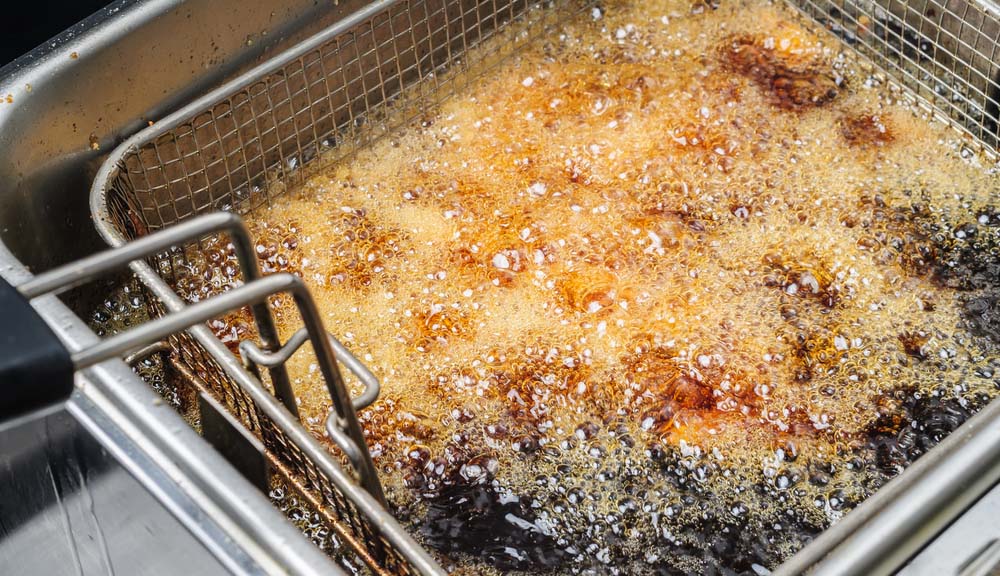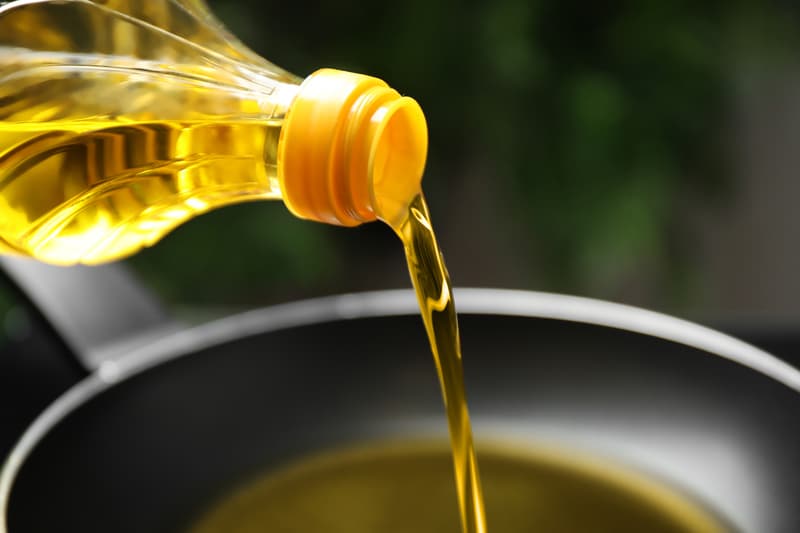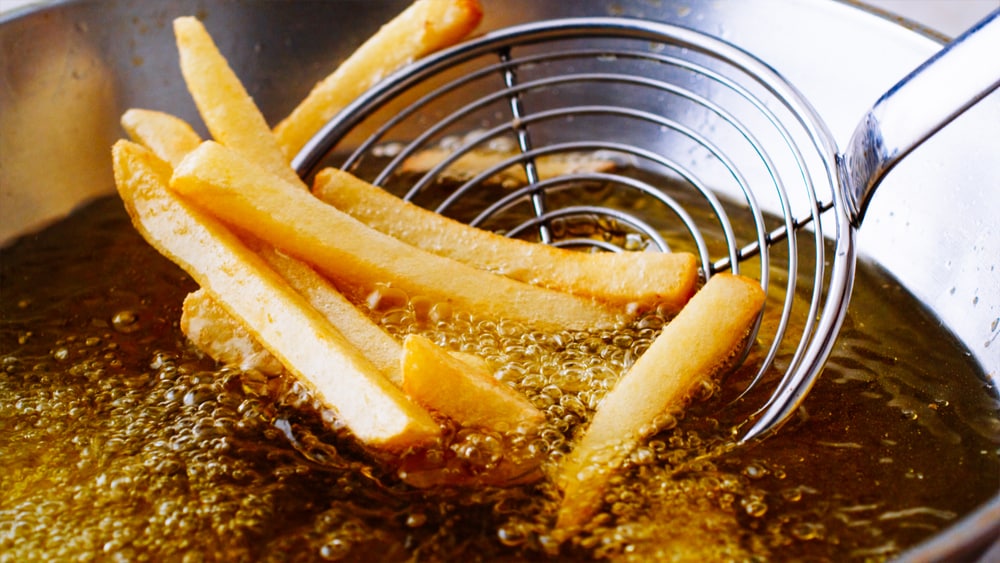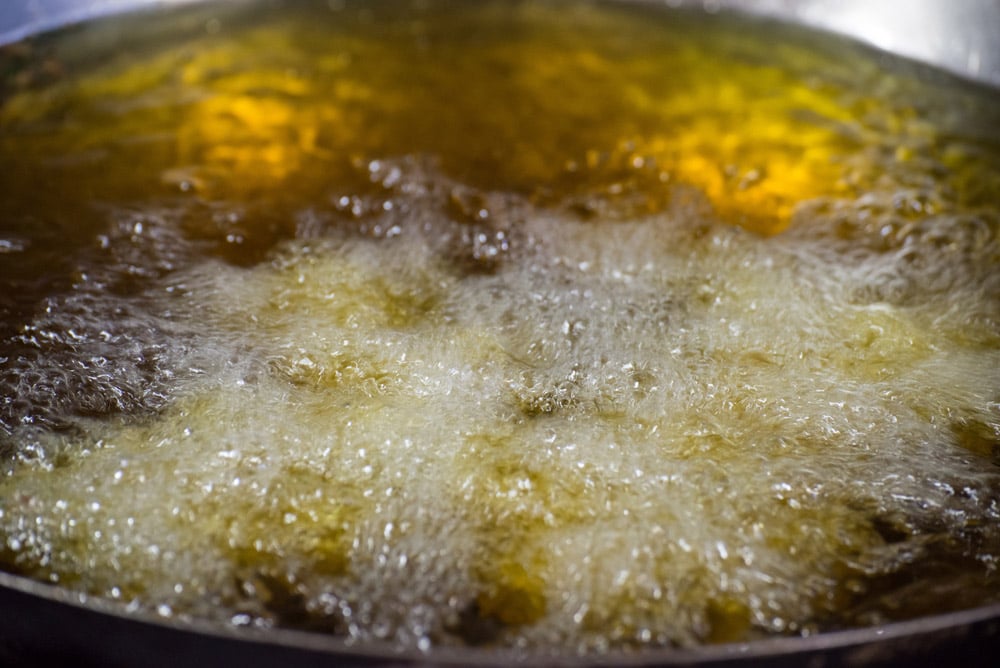
A homemade fry-up is comfort food at its best. However, it can become messy when oil splatters everywhere and the oil foams up when you add the food. This doesn’t look particularly appealing and can also affect the taste of the food.
In this article, we give you some tips on frying at home and how to prevent the hot oil from foaming.
How To Stop Oil From Foaming When Frying
- Wash The Utensils Well Before Use
It is important to wash your frying pan properly right before you use it to remove any residues. You can use dish soap and hot water for this purpose.
After washing the frying pan, dry it with a clean cloth or kitchen towel as any water in your frying pan will cause the oil to make bubbles and result in foaming and spitting. If you are using a deep fryer, then wash the frying vats with the help of warm water.
Do not use soap in this case. This is because any left-over soap or detergent can react with hot oil resulting in foaming when frying the food. Leftover soap will also change the taste of your food.
- Use the Right Oil
It is highly recommended to use an oil that is suitable for deep-frying your food. Low-quality oils that are not made for deep frying have a high quantity of moisture in them which can lead to foaming as the temperature rises gradually.
Using the wrong oil can also affect the taste of your food. Vegetable oils are the best for deep frying, specifically canola or peanut oil. These highly refined oils leave no taste on the food and have a high smoke point.
Other options include grapeseed oil, soybean oil, corn oil, or cottonseed oil. Olive oil is the healthiest but is expensive if you’re deep frying. You do not need an extra-virgin olive oil for frying – rather keep that for salads or sprinkling over food.
For frying chicken and French fries, we recommend vegetable, canola, or peanut oil. If you’re just pan-frying, use olive oil, coconut oil, or butter depending on the recipe.
- Too Much Batter Or Moisture
Make sure that the batter on your food is not dripping into the hot oil. Too much batter on the food can overload the oil with moisture which causes it to foam up. Therefore, when you are battering your food, it is suggested to do 1 to 2 coats of batter only to avoid foaming of oil.
Also, make sure the batter isn’t too runny. If you are not battering your food, then pat your food items dry with a clean kitchen towel or paper towel before frying them.
This is because too much water in the hot oil causes the oil to form bubbles and results in foaming or spattering. Drying is important for food rich in starch such as potatoes that can hold a lot of water.
- Avoid Overheating The Oil
While frying the food, make sure not to overheat the oil. This can cause the oil to foam and smoke, and the food to burn instead of turning that delicious golden brown. If you’re frying in a tabletop deep fryer, temperature control is easy because everything is preset.
However, if you’re using a wok or Dutch oven on the stovetop, you will have to measure the temperature yourself with a special thermometer. The normal temperature range for deep frying is between 350˚F and 375˚F.
Once you reach the perfect temperature for frying your food, turn down the flame to maintain the temperature. If the oil overheats, it will start to smoke and make bubbles leading to the foaming of the oil.
It will also cause the food to change its flavor. Also, the food might burn because of overheating of the oil.
- Keep The Oil Clean
It is recommended that you change the oil often and avoid using old oil. The oil should also be filtered to remove the food particles when using it again.
The more particles are introduced into the oil and the smaller they are (such as bits of flour), the faster your oil will break down and have to be replaced. Sometimes, foaming of oil is an indication that the oil has gone bad or it is too old to be used.
With crumbed or battered foods, you can reuse the oil up to four times. If cooking potato chips, you can reuse the oil up to eight times.
You can tell that your oil needs replacing if there is foam on the surface, if it smokes before getting up to the right temperature, or if it has a dark, dirty look and a musty smell. To clean oil after you have used it, first skim any big pieces of food out of the pot.
Then strain the oil through a fine strainer into a clean pot. If there’s any debris at the bottom, be sure not to pour this in. When the oil is completely cool, use a funnel to return the oil to its original container. When you reuse the oil, it will be clean and shouldn’t foam.
- Store the Oil Correctly
Oil’s worst enemies are light, humidity, and heat. Don’t store your bottles of oil on the kitchen windowsill. They need a cool, dark place and a tightly sealed bottle.
There you have it! Our six best tips on how to prevent your oil from foaming. If you have any more, please share them with us in the comment section below. Thanks for reading!



Thank you ,you have answered my questions nicely.